
Charles Bulfinch was an early American architect, and has been regarded by many as the first American-born professional architect to practice.

George Leonard was an American lawyer, jurist, and politician from Norton, Massachusetts. Besides service on state court benches and in both houses of the state legislature, he represented Massachusetts in the U.S. House of Representatives.
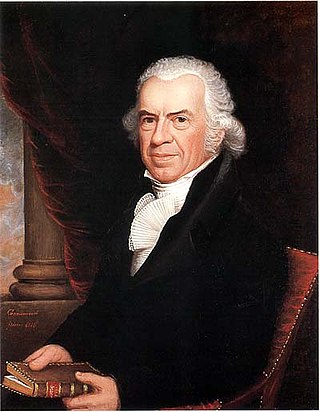
Isaiah Thomas was an early American printer, newspaper publisher and author. He performed the first public reading of the Declaration of Independence in Worcester, Massachusetts, and reported the first account of the Battles of Lexington and Concord. He was the founder of the American Antiquarian Society.
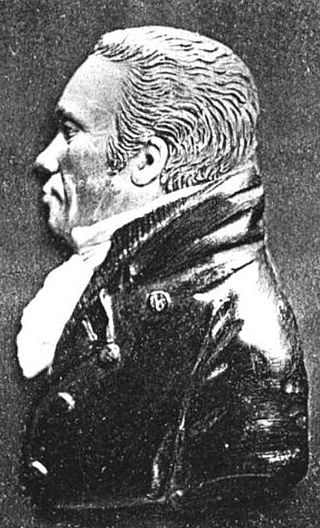
Thomson Joseph Skinner was an American politician from Williamstown, Massachusetts. In addition to service as a militia officer during the American Revolution, he served as a county judge and sheriff, member of both houses of the Massachusetts legislature, U.S. Marshal, and member of the United States House of Representatives. He served for two years as Treasurer and Receiver-General of Massachusetts, and after his death an audit showed his accounts to be deficient for more than the value of his estate, which led to those who had posted bonds on his behalf having to pay the debt.
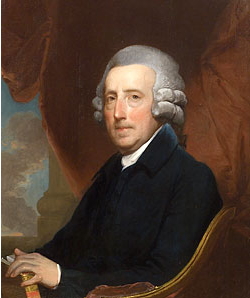
Thomas Dawes was a patriot who served as a Massachusetts militia colonel during the American Revolution and afterward assumed prominent positions in Massachusetts's government. His positions included membership and chairmanship of the Massachusetts Governor's Council and representative in both the House and Senate. As chairman of the Governor's Council, Dawes served briefly as the de jure presiding officer of the executive branch of Massachusetts' state government for ten days – May 20, 1800 to May 30, 1800 – following the death of first Governor Increase Sumner and then Lieutenant Governor Moses Gill.
Angelo Tarchi was an Italian composer of numerous operas as well as sacred music. Between 1778 and 1787, he worked primarily in Italy, producing five or six new operas each year.

The Quincy family was a prominent political family in Massachusetts from the mid-17th century through to the early 20th century. It is connected to the Adams political family through Abigail Adams.
Gerrardus Wynkoop was a member of the Pennsylvania House of Representatives from Bucks County and served as speaker of the House in 1793.
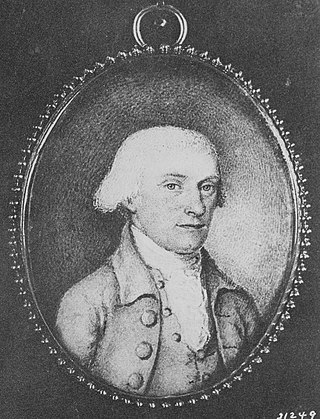
Caleb Davis was an American merchant, revolutionary patriot, and public servant in Boston, Massachusetts. He held several positions of public trust, including state legislator (1776–1788), Speaker of the Massachusetts General Court (1780–1782) and Elector for Massachusetts' Suffolk County in the first U.S. presidential election in 1789.
William Blagrove was a bookseller, publisher and librarian in Boston, Massachusetts, in the early 19th century. He ran the Union Circulating Library, a subscription library on School Street, from 1804 through 1811. As a publisher, he issued "a chaste collection of amatory and miscellaneous songs, designed chiefly for the ladies" in 1808.
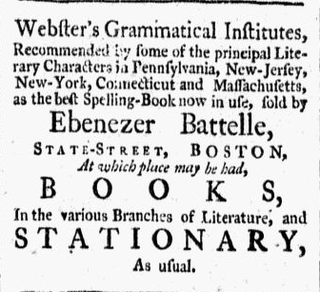
Ebenezer Battelle (1754–1815) was an American Revolutionary War veteran, a bookseller in Boston, Massachusetts, and a settler of Marietta, Ohio, in the late 18th century.
The Massachusetts Register is the bi-weekly publication mandated by the Administrative Procedures Act ; it is an official organ of the Massachusetts state government. The Register publishes new and amended regulations; notices of hearings and comment periods related to prospective or draft regulations; and a cumulative index of regulatory changes for the current year. The Register also publishes notices of public interest, as well as opinions of the Attorney General and Executive Orders. The Register is a printed publication; online subscription is also available. This era of publication of the Massachusetts Register began in April 1976.
The Portland Library Society (1763–1826) or Portland Library was a subscription library in Portland, Maine. The library "was originally established in 1763. It was revived in 1786, and re-established in 1806." Samuel Freeman served as librarian ca.1785-1807; followed by Oliver Bray (ca.1812-1817). New members were elected. The annual fee for each member was "two dollars per year in 1784 and fifteen dollars by 1801."
John Dabney (1752–1819) was a postmaster, publisher, and bookseller in Salem, Massachusetts, in the late 18th and early 19th centuries. He was born in Boston in 1752 to Charles Dabney and Elizabeth Gardner. With Thomas C. Cushing, John Dabney published the Salem Mercury newspaper, 1787-1789. In 1790 he married Abigail Mason Peale (1767-1834). Beginning around 1790 he ran the "Salem Book-Store" which offered books for sale or short-term rental; customers included William Bentley. Dabney also served as Salem postmaster ca.1792-1815. He belonged to the North Church in Salem and the Essex Lodge of the Freemasons. Dabney sold the contents of his shop at auction in 1818. He died in 1819.

Isaac Smith Jr. was an American librarian, minister, and educator.










